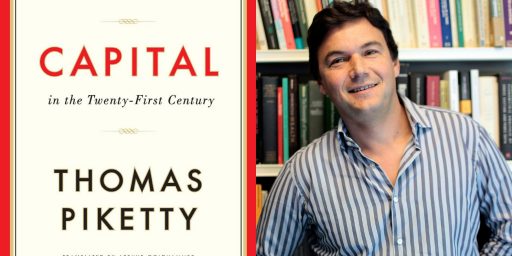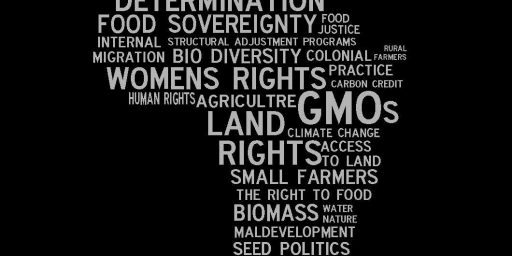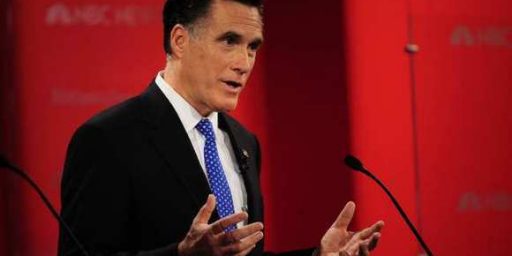USA a Banana Republic?
NYT columnist Nick Kristoff says America's income inequality makes us a banana republic.
NYT columnist Nick Kristoff laments “Our Banana Republic.”
In my reporting, I regularly travel to banana republics notorious for their inequality. In some of these plutocracies, the richest 1 percent of the population gobbles up 20 percent of the national pie.
But guess what? You no longer need to travel to distant and dangerous countries to observe such rapacious inequality. We now have it right here at home — and in the aftermath of Tuesday’s election, it may get worse.
The piece goes on for several more paragraphs, but you needn’t bother reading them. The US has high income inequality. So does, for example, Nicaragua. QED.
Wikipedia’s definition of banana republic is an accurate reflection of how the term is used:
Banana republic is a term that refers to a politically unstable country dependent upon limited agriculture (e.g. bananas), and ruled by a small, self-elected, wealthy, and corrupt politico-economic clique. The original concept of banana republic was a direct reference to a “servile dictatorship” that abetted (or supported for kickbacks) the exploitation of large-scale plantation agriculture, especially banana cultivation. As a political science term banana republic is a descriptor first used by the American writer O. Henry in Cabbages and Kings (1904), a book of related short stories derived from his 1896-97 residence in Honduras, where he was hiding from the U.S. law for bank embezzlement in the U.S.
So, Kristoff is taking a common byproduct of this phenomenon and asserting that the United States, which has said byproduct, therefore qualifies. Except that, you know, our economy isn’t based on agriculture, much less a single crop. Oh, and that we have elections to decide who will govern us and periodically throw the bums out. Oh, and a complex system of divided government and checks and balances. And, of course, a broad series of individual rights that are guarded by an independent judiciary.
Yes, but for how long? Why, the Republicans want to extend the current tax code indefinitely into the future! Which means that those making over an arbitrary sum that some define as “wealthy” will continue to pay a top marginal rate of 34 percent instead of a more appropriate 39 percent. Apparently, somewhere in the mid-thirties, there’s a magical dividing line with “socialism” on one side and “banana republic” on the other.
Also, apparently, the rich are oppressing the not-quite-rich by buying fancy things, forcing everyone below them to go heavily into debt to try and keep up.
Seriously, Kristoff is too smart for such nonsense. There are good arguments as to why income inequality is unhealthy. Let’s dispense with silly ones.
And, for that matter, there are actual threats to our individual liberties and the rule of law that are far more likely to engender comparisons to Third World dictatorships than the fact that the top 1 percent consume a lot of stuff.






The crop that the U.S. is best at producing is government. In the vast majority of cities in the U.S.the best job to have is a city or county job. In most states, the best jobs to have are government jobs. There are maybe 20 metropolitan areas where the government is not the best paying job.
The DC metropolitan area has the lowest unemployment rate in the U.S. and has some of the richest counties. Just like no sane person would invest in a Banana Republic, no one is interested in investing in a country with so much government and so many levels to pander to.
And just like ina third world country, the elite live very separate lives from the middle class and the elite use the national treasury to pay off the poor.
@Superdestroyer – If you want to get rid of a majority of thos high paying government and contractor jobs in DC, all you have to do is cut the defense budget by 50%. I happen to be one of those govvies who live off taxpayer money worknig for the DoD, but I bet that’ll never happen with the new congress.
This is hyperbole taken to the absurd.
I would not argue that things here are perfect, but I don’t think the comparison is legitimate.
I’m struggling to figure out heat the he’ll you’re talking about, James. We have a judiciary which has supported and affirmed the president’s right to violate our laws at will. We have a president with literally no limits on actions he may judge necessary for “national security”.
That we have elections is meaningless. What major differences in policy will result from Republican victory? Will we see reform of the national security state, or limitations on the ever-expanding power of the imperial presidency? Will we see an end to the revolving door between industry and government, or a reversal of the rot and corruption which have become endemic in our nation’s capital? The electorate lurches from party to party, replacing a gang of rascals with a mob of ruffians. It has not yet realized the one-man, one-vote paradigm has been effectively nullified.
Most of our elected officials are millionaires, or very close. Explain to me how those who spend their adult life in “public service” becomes wealthy without systematic corruption. Explain to me how the investments of our senators consistently outperform those of ordinary citizens without rapacious exploitation of their power and status.
How have the Masters of the Universe, those titans of Wall Street, escaped prosecution for systematic fraud? Oh yes, they just happen to be the top campaign contributors to both parties. Now those responsible for nearly sinking our country pay themselves record bonuses with taxpayer money. They borrow money from us interest-free and loan it back to us at four percent.
The system now exists to serve the interests of the powerful at the expense of the powerless.
That fits the definition of a Banana Republic to me.
Does increasing income inequality in the U. S. bother me? Definitely. Do I know what to do about it? No. All of the proposed solutions I’ve seen redistribute income from the top .1% to the next highest 4.9%, hardly the cure we’re looking for.
I note that the OECD countries with great income equality tend to be more ethnically homogeneous than is ours. I wonder what our Gini coefficient would be if immigrants and their children were discounted.
I’m not suggesting that presents a solution. Just suggesting that a) the problem may not be as great as the raw numbers might suggest and b) social policy might be more effective in altering the trajectory than fiscal policy.
I also wonder what effect the very high incomes in the financial sector influence the figures. As incomes in the sector fall (already happening) that may rectify itself.
1-) Banana Republic in a broader sense is a term used to describe backward countries in Latin America. Even a Democratic country with a diversified economy, like Brazil, is attacked as a Banana Republic when people wants to complain about something in their country.
And that´s part of the problem with Kristol´s column: that´s pretty offensive to people in Latin America.
2-) Hong Kong and Singapure have high Gini indexes(The most used unequality indicator), while several poor countries have low Gini indexes. By the way, Kristol decided to use three countries with relatively low Gini indexes as a example of unequal countries: all the three have Gini indexes that are not only smaller than in countries like Colombia, Chile and Brazil, but than the United States.
3-) The feature more commonly associated with countries in the Third World that the United States are acquiring is a very high debt to GDP ratio, not income inequality. They are even printing money to pay for their bills.
The US is not firing on all cylinders, and so some analysis and self-criticism is justified. More than justified in fact. It may be quite needed.
Then it’s just a question of what metaphor of failure you use to grab eyeballs for your analysis. The big ones I think are “we are becoming Japan,” “we are becoming Europe,” and “we are becoming a banana republic.”
Marshall Auerback, in a letter to Naked Capitalism, uses the banana republic in a piece about us becoming Japan! A two-fer.
All told I get 698 hits for “banana republic” in my Google Reader feeds.
Education is a big spending category, and seems wider than that.
We could do better. In my opinion the European solution of sending fewer people to university but giving more of them full rides, seems the answer.
john personna:
I’m skeptical at the value of increased educational spending as such doing much about income inequality. Many of the top income earners are graduates of a handful of schools. Harvard sheepskins for all! But jjust as with healthcare spending we’re already spending a multiple on education on a per capita basis (or, obviously, overall) that any other OECD country does.
Additionally, it’s unclear to me how effective increased resources for education can be when the high school dropout rate is persistently high. In New York, Chicago, and Los Angeles it’s roughly 40%.
Again, I don’t think that the greater problem is income inequality among people who are already in the highest income quintile. I think it’s between those in the top 5% and everybody else.
Actually Dave, I didn’t say increased spending.
I think we should spend less, but with more discipline, and then yes that is an effective way to push benefits across the income distribution.
Be specific. I’m interested. You’ve sometimes mentioned eliminating subsidies for studying humanities and increasing them for the sciences. Note that according to the BLS the U. S. has 500,000 fewer jobs for engineers now than it did in 2000.
I see no way for education spending however allocated to have much effect on income inequality with such a high proportion of high school dropouts. If we’re going to write those kids off entirely, maybe we shouldn’t include them in the figures for income inequality either.
I think K-12 has has already been trimmed in this recession. That’s true in my area for sure, with some non-core teaching positions lost. One would hope that they are trimming the “middle management” that is said to have grown in the last decades first. I’ve also heard that the various state and federal programs in the last decades expanded reporting requirements, requiring in turn that management. If so, scrap that. If there are extra-curricular programs left to be cut, cut them. We aren’t as rich as we thought we were, and can’t afford as much as we thought we could.
At university level I definitely think schools should review the productivity of their degrees, and shed dead-end majors. They should also review general education requirements to make sure they haven’t become “rent” for those same departments.
And finally reinvention with technology at all levels. We won’t know what’s possible until we develop and test, but it seems absurd that we need butts in classrooms as much in 2010 as we did in 1910.
BTW:
No one who believes in markets would say such a thing.
When the top paying degrees are all in engineering, then we are not over-producing those degrees.
“Oh, and that we have elections to decide who will govern us and periodically throw the bums out.”
Elections, when here are no real differences between the two alternatives, are irrelevant. The dem and rep parties have very little difference between them, even if they shout about those differences a lot. Compare our diversity of politics to pretty much any european nation- they have a spectrum (often a deficient one, but some nonetheless) while we have a slightly oblate point.
“No one who believes in markets would say such a thing.”
People who believe in markets are unbelievably gullible and refuse to see the vast mountains of evidence that directly contradict their chosen faith. They should be ignored in polite company.
I think Tlaloc, the only way you can avoid being a hypocrite is if you are a Buddhist monk, sitting at the side of the road, with your rice bowl. (Did a passer-by let you borrow a notebook?)
Anybody else, even old line communists, has some money in their pocket and trust in the market even if it was only the local farmer’s market.. Actually, it is all as ancient as trade routes and shell necklaces thousands of miles from the sea.
(Now maybe you were just foolish and thought that a trust in markets meant blind trust, or trust in nothing else, but that would be a terrible ignorance of human history.)
“The piece goes on for several more paragraphs, but you needn’t bother reading them. The US has high income inequality. So does, for example, Nicaragua. QED.”
Actually, Mr. Joyner, you probably should have read the entire thing before commenting on the article as a whole. The “banana republic” thing was just a narrative hook.
The real meat of the story was the question about whether, given such extreme and growing income inequality, it was such a terrible thing to allow the Bush Tax Cuts to lapse for the wealthiest Americans.
But you just dismissed his main argument so you could pat yourself on the back for pointing out that America is not actually a banana republic. Well, kudos to you for that stunning insight.
If you care to go back and read the entire article and discuss the actual point he was making, that might be a more useful endeavor.
Also, the TITLE of the piece. So, sorry, it’s an outrageous and stupid hook.
I address this in my post as well.
How about if you print 600 billion to give away and then say you can’t afford to borrow 700 billion so that you don’t have to take it away . How do you like them bananas? lol….
I would hardly characterize your comments as seriously addressing Kristof’s point. In your post, you said:
“Also, apparently, the rich are oppressing the not-quite-rich by buying fancy things, forcing everyone below them to go heavily into debt to try and keep up.
Seriously, Kristof is too smart for such nonsense.”
That is in response to Kristof saying:
“Robert H. Frank of Cornell University, Adam Seth Levine of Vanderbilt University, and Oege Dijk of the European University Institute recently wrote a fascinating paper suggesting that inequality leads to more financial distress. They looked at census data for the 50 states and the 100 most populous counties in America, and found that places where inequality increased the most also endured the greatest surges in bankruptcies.
Here’s their explanation: When inequality rises, the richest rake in their winnings and buy even bigger mansions and fancier cars. Those a notch below then try to catch up, and end up depleting their savings or taking on more debt, making a financial crisis more likely.
Another consequence the scholars found: Rising inequality also led to more divorces, presumably a byproduct of the strains of financial distress. Maybe I’m overly sentimental or romantic, but that pierces me. It’s a reminder that inequality isn’t just an economic issue but also a question of human dignity and happiness. ”
So he cites a scholarly paper, and you just dismiss it. Why is it wrong? Because you say it’s wrong. No insight, no reasoning. Just “I’m being smart and Kristof isn’t”. Incredibly weak.
I mean, imagine if you wrote a thought-out piece and did research into what scholars in the field are saying about it. And then somebody responded by saying “That’s dumb; Joyner should know better”. Would you find that response remotely convincing?
Hear, Hear, trueofvoice…Grand slam, 1st round KO, Triple crown winner….you outlined precisely the reality that no one here seems to want to admit to, hence the gibberish which follows your fine post, arguing over how many angels can fit on the head of a pin and ginni coefficients etc.
What more need be done to destroy the social consensus we had from 1932 to 1980?
Thanks to the moronic right wing which worships at the altar of greed, tell me what progress have they done in their 30 years of political hegemony for the middle class?
The pawns of the power elite have shipped jobs overseas, turned our regulated savings and loans and financial banks into basket cases all the while looting and thieving their way into ever more positions of power and influence.
My God it took Ike to force the German people to bury the Jewish corpses so they could not deny what had just happened in their country.
Perhaps when the present brain dead republicans are successful in killing off the last vestiges of the New Deal (social security, minimum wage., Wagner act) we will be so screwed that their bs will no longer resonate and the the repubs will again walk in the wilderness of political life, banished for the next 60years into irrelevant oblivion, much like the greatest generation did to those repubs (Hoovervilles, isolationists who wanted to keep us out of WW2) from 1932 to 1992 (thanks clinton for screwing that up).
The fact is, those now voting have no clue about history and of course, as Santayana warned, are now destined to repeat it….google Pecora hearings and their recommendations (now repealed) as proof that some right wingers will never get it.
I don’t say it’s wrong; I dismiss it as not evidence that we’re a banana republic. Basically, the paper says that people envy people with more money and stress themselves out trying to keep up or at least give the appearance of keeping up. Well . . . so what?
That’s just false.
You said “Also, apparently, the rich are oppressing the not-quite-rich by buying fancy things, forcing everyone below them to go heavily into debt to try and keep up.
Seriously, Kristoff is too smart for such nonsense. There are good arguments as to why income inequality is unhealthy. Let’s dispense with silly ones.”
You were not talking about the “banana republic” business here (your “Also” makes it clear that you’re going in a new direction). You called the paper’s conclusions about income inequality “silly” without any further explanation.
Simon Johnson has a much more interesting take on how the US is taking on the characteristics of dysfunctional developing countries (he even uses the term “banana republic”):
http://www.theatlantic.com/magazine/archive/2009/05/the-quiet-coup/7364/
How the recent foreclosure scandals eventually get resolved may provide additional evidence to support Johnson’s ideas.
The US is becoming a Banana Republic by using the same fiscal policies. They are even printing money to pay their bills. David Stockman is right on this(I know that because I live in a country that faced the same problems).
And another British Disease sighting as well.